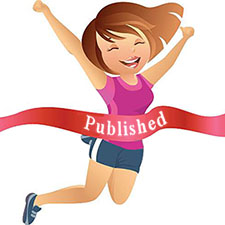
n fifth grade, I faced a super-difficult decision. Regardless of which of the two options I chose, the decision in and of itself would affect my entire life. How so? Because the kinds of things that you do as a kid, the identities you choose, will stick with you. Even as you grow up and change into a totally different person, those kid versions of you and the decisions you made will always be a part of you, your life, your identity.
So.
Should I try out for the cheerleading team or for the basketball team?
***
A lot of what I’ve written for this column on the subject of submissions has been based on encouragement, having a good attitude, and providing tips to make you less anxious about the submission process. Though, to be honest, at times I feel like I’m writing these columns more to encourage myself to submit my work with a good, peppy attitude than for your benefit. Perhaps I am. I mean, I write personal essays. Of course everything is about me.
We writers are a very eclectic species. We put our brains on a page and are constantly translating the world and our experiences into a bunch of letters grouped together in ways that we may obsess over for months, years, even decades until we feel like they are ready to go out into the world to further be judged and then revised and then re-obsessed over and then, finally, published.
It takes a lot of energy and patience to do all of that, which is awesome, but check this out: Ultimately, we don’t have a choice as to if we get published when we submit our work. That would be the editor’s decision. Considering the amount of energy we put in to perfecting our words, this is a sad fact. But in the face of such potential tragedy, we need to cheer ourselves on, to keep going, because if we don’t keep going, we will never see our work published. How to keep going? Realize that you do have choices when it comes to submissions. Our publication success will depend on our ability to make informed decisions and to be true to ourselves and what we know of our work and desires.
“We need to cheer ourselves on, to keep going, because if we don’t keep going, we will never see our work published.”
Identifying as a tomboy since second grade, when I was faced with this anxiety-producing, road-forked decision, I thought that cheerleading sounded interesting; but participation in something that required a skirt and perhaps even makeup worked against my core belief that I was a sporty girl. No cheerleading for me. Basketball it was.
But then, with my decision made, I still had to face the challenge of trying out for the basketball team. Making the team was not my decision. The coach would decide that. But I made an informed decision to try out for the team because I knew the kind of person I was and what activities I enjoyed. I knew that I’d have to practice my skills to even have a chance to make the team. Because that was truly the only choice I had in the matter: how much effort I wanted to put in to practicing basketball to set myself up for success—for making the team. Knowing that I would enjoy playing H-O-R-S-E with my dad after dinner more than trying to do the splits when I couldn’t even touch my toes were the facts I used to make my informed decision.
***
How do we set ourselves up for success when it comes to getting our work published? By practicing our skills and making those informed decisions as we ask ourselves two main questions:
- What should I submit?
- Where should I submit it?
Question #1: What should I submit?
Answer: A final draft.
Seriously. You can choose any piece you want to submit, but ultimately, the only thing you should submit is something that is in a final draft form.
To be a successful writer, you need to be informed about the art of writing. Knowing craft techniques will help you to know what questions to ask as you revise your work. This doesn’t mean you have to go get an MFA, but read a craft essay or two. Read book reviews and take note of the subject matter that is addressed and critiqued. These aspects are what editors are looking for as they read.
Think of it this way: you probably shouldn’t try out for the basketball team if you’ve never even held a basketball. There’s something to say about dreams, but there’s also this little thing called reality. As writers, we must face this reality with our own work. Learn how to be your own editor. Get objective with your writing. Don’t take it so personally. Writing is just words on a page. How we read that writing is where meaning is made. So approach your work not as, “This is my writing,” but as, “Look! Words on a page! I wonder what they have to say!”
“You probably shouldn’t try out for the basketball team if you’ve never even held a basketball.”
(The following is a necessary paragraph for you to read because it will act as a segue of sorts into a metaphor I’m about to use in my response to the second question I posed: Where should I submit?; I couldn’t figure out any other way to work the following paragraph into this column without this super-long, justification-based sentence.)
When I was a freshman in high school, all the hopeful basketball players were told that if they ran on the cross country team, they would automatically make the freshman girls’ basketball team. I hated running, but did it because that’s how much I wanted to play basketball. Three years later, when I was 17 years old, I quit the basketball team, so I could train for my first marathon. Now, running is the only sport I enjoy engaging in. So although I’m no longer a basketball player, having made that decision to try out for the basketball team in fifth grade eventually influenced an aspect of my identity that will last for the entirety of my life: I’m a runner. Even though I smoke. Whatever. It’s my identity, my choice. Let’s move on to the second question now.
“Publishing online will give you more cheerleaders.”
Question #2: Where should I submit?
Answer: To the journals you want to publish you.
Seriously. I’ve written before about how there is value in both flinging your work at any publication that exists versus researching journals until you find one that you think is perfect for your work. These modes of submitting are still valid, though there is one thing to consider: would you be proud to share your publication with someone? If you think a journal’s website is hideous, then don’t submit to them. If the writing they have already published doesn’t intrigue you, then don’t submit to them. Again, where you submit is your choice.
One other decision you must make in terms of where to submit your writing will be addressed more in-depth in my next column; so for now, I want to briefly bring up that thought on being published in a print journal is more of a “real” publication—as if we’re all children here, and to see something, we have to be able to touch it. So, the words you are reading right now don’t exist in the “real” word because they are made from pixels and not ink or because you can’t touch them. Um. Okay. Touch your screen!
Publishing online will give you more cheerleaders—it is easier to share links than force your friends to buy a journal, and more people who you don’t know will have a better chance of stumbling upon your writing when they’re falling into the abyss of randomly googling things. Print is like running a marathon. (BAM! Metaphor, as promised!) It can take longer to hear back, and you’ll be a little more alone at times because people aren’t there to cheer you in the comments section (because that doesn’t exist in print journals).
Ultimately, though, this is a choice for you to make, too. If you truly believe print is the only valid medium of publication, then go seek out those print journals. If you want more opportunities to share your work online, then go for the online journals.
Either way, published is published. Whether it’s on screen or in print, any publication is “real.” They are words you wrote, and the world has an opportunity to read them. Pixelated words are not fake words. They’re just a little less tactile.
The end.

“Published is published. Whether it’s on screen or in print, any publication is ‘real.’”
I’m super-glad I made the decision to try out for the basketball team in fifth grade. Cheerleading might have been fun, but this column is the space where I get to flex my pep-provider muscles I could’ve used in cheerleading. As such, this final bit of info below is for you to see an example of the number of choices that a writer has, as she works hard at getting her work out into the world:
- I could have chosen to start this column differently.
- I could have chosen to discuss more choices we have as writers.
- I could have chosen to not use sports metaphors at all because I generally tend to hate sports metaphors.
- I could have chosen to actually figure out a way to work that one paragraph into the essay, so I didn’t have to have the lengthy justification sentence that I put immediately before it.
- I could have chosen to focus more on the print vs online element. (Which is what I have chosen as my topic for the next column!)
- I could have chosen to end this column on the pretty-much-a-perfect-sentence-to-end-a column-on that I used in the last section: the end.
***
Next column, we’ll chat with Becky Tuch, founding editor of The Review Review.

Chelsey Clammer is the author of BodyHome and won the 2016 Red Hen Press Nonfiction Manuscript Award for her essay collection, Circadian. Her work has appeared in The Rumpus, Essay Daily, McSweeney’s, and Black Warrior Review, among many others. She’s the essays editor for The Nervous Breakdown. @ChelseyClammer www.chelseyclammer.com.
Chelsey is also an instructor for WOW! Women On Writing. She’s offering column readers a Submissions Consultation of up to 12 pages (4,500 words). Find out more.
-----
Previous columns:
What to Expect When Expecting to Work with an Editor
Submissions Flowchart
Them Fightin’ Words
Writing Contests: You Have Nothing to Lose
Breathe and Proceed: Poet Tammy Robacker on How to Submit the Hard Stuff
How to Hold Your Horses
Caring About cover Letters (because nothing says “please reject me” like a terrible first impression)
Find or Fling? Figuring Out Where to Submit
Rejection Acceptance: Interview with author/editor Jac Jemc
Hard-Working Writer Seeks Widely-Read Journal
What My Submissions Spreadsheet Teaches Me
Submit ’Til You Make It